After overcoming childhood cancer, Texas Tech Online graduate Sophia Ortiz had the flexibility to use the pageant system as a platform to promote her foundation.
Sophia Ortiz, now 23, thinks back on her 15-year-old self and is amazed – and grateful – at where life has brought her in the past eight years. She learned the hard way that “Life is Precious,” the name of her philanthropic foundation.
To say Sophia’s pursuit of a degree from Texas Tech University was quite a journey is a colossal understatement. Graduating last December as a Texas Tech Online student with a bachelor’s in General Studies, she chose biology, chemistry and health professions as her three areas of concentration. But along the way she has endured and enjoyed; grieved and celebrated; and pursued and conquered. Not just in her studies, but also in her life.
In the fall of her sophomore year of high school, Sophia was sleeping more than a normal teenager would. After a day at school she would nap two or three hours. Any one activity for very long would drain her. She was lethargic. This was not normal for the active teen who was involved in so many school and volunteer functions. Sophia had been studying hard for the SAT and ACT standardized tests, as she would soon start applying to colleges. But she hadn’t been feeling well all week.
One night her family was gathering for their weekly dinner with “America’s Got Talent” on television. During the meal they always enjoyed discussing the wacky things some of the acts would do on the show.
Sophia’s mom, Mary, was getting everyone’s dinner fixings together, and they were beginning to all sit down on the rounded chairs surrounding the table in their game room, where the view of the TV was best.
“The meal came out. I was feeling very lightheaded. My vision was spotted. I could see black with white splashes. And that’s the last thing I remember seeing,” Sophia recalled.
Sophia’s parents rushed to get her off the floor. Realizing she was burning up, her mom hurried to get a thermometer, which soon read 105 degrees Fahrenheit. Quizzing her daughter, the episode didn’t seem to be caused by anything Sophia had done during the day. Mary thought through possible scenarios. Not going to the gym. Not being outside. Nothing so strenuous as to elevate Sophia’s temperature that high. Must be attributed to stress, studying too hard – giving her daughter a headache. She just figured Sophia needed to take it easy. Mary wasn’t ready to assume the worst. They attempted to bring down Sophia’s fever.
“That was the night they put me into the bathtub with a whole bunch of ice,” Sophia recalled. “And then they blended up a Gatorade slushy for me. We spent that whole night trying to get my fever down, but it didn’t really get lower than 103.”
Sophia’s dad, Orlando, being a dentist, has many friends in the medical field who are doctors. Her parents took Sophia to one of their clinics to get some answers.
She remembers going into the clinic the next morning, still dressed in her pajamas and dripping with sweat. The staff asked all the typical questions and did all the checks and tests to determine Sophia’s malady. They needed bloodwork, but they didn’t want to wait over the weekend for lab results. Fortunately, the physician she was seeing was trained to read a blood smear under a microscope, so with a prick of her finger, the Ortiz family was on their way to some answers.
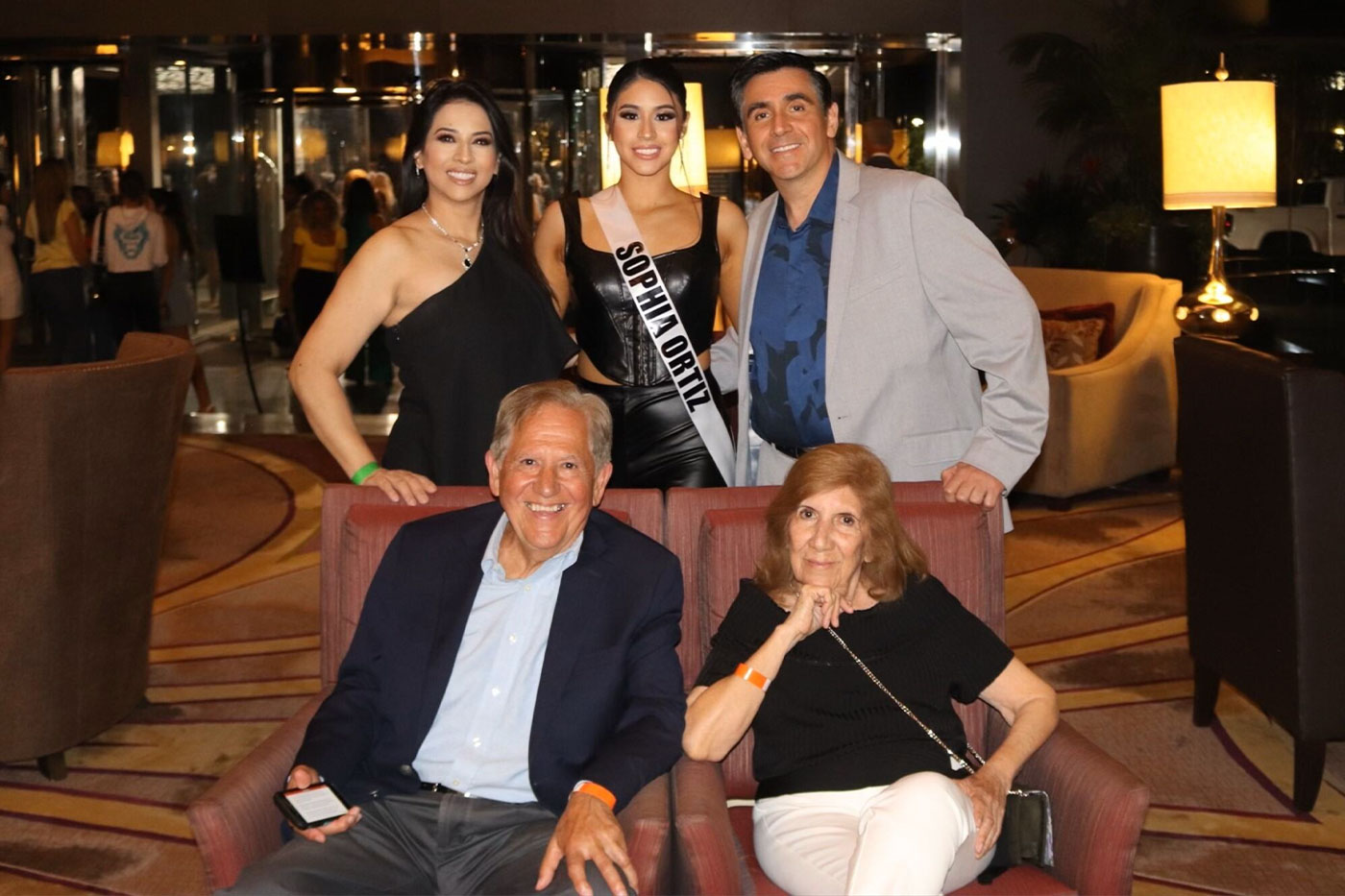
When the doctor took her initial look at the slide, her expression went flat. Sophia was in the room. She recalls almost every doctor in the clinic, all friends of her family and people who had treated her for her whole life, coming in to see her, so the room was quite full. Young Sophia knew this was not normal. The physician had other doctors in the room also look at the slide. Then they left the room with her parents to discuss what they’d seen.
There were zero white blood cells in the blood sample. There were barely any platelets, and the red blood cell count was very low.
“In that moment, they came back into the room and told me they would have to send more blood to the lab for testing; but the doctor had already told my parents, and what they saw was very typical of leukemia,” Sophia explained.
Due to Mary’s side of the family having an extensive history of cancer, their worries were heightened. Sometime much later, Sophia was told the gravity of her situation.
“When I heard that news, my chances of coming out of leukemia well were not bright,” she said. “It was just a few months before I turned 16, and it was really just a terrible moment in my life,” Sophia said, a somber look crossing her face. “Nobody wants to hear the words, ‘You have cancer,’ especially someone so young and full of hope for the future.”
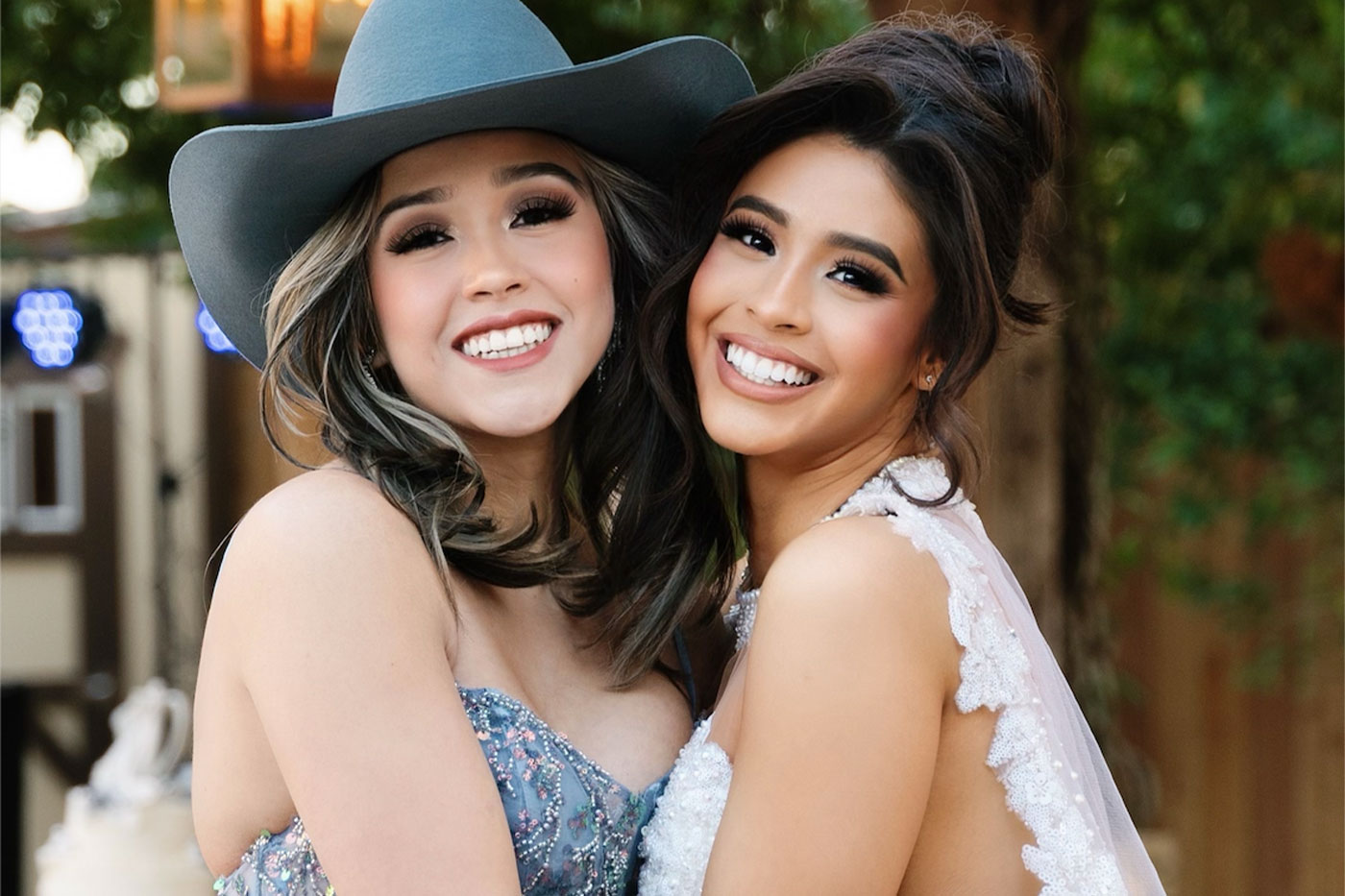
Sophia’s sister Valerie is a junior animal science major in the Davis College of Agricultural Sciences & Natural Resources at Texas Tech. She was 13 and in eighth grade when Sophia was diagnosed. Valerie didn’t really know what was going on at first, but she could tell Sophia was sick, and the younger sister was worried.
“I can tell a lot about my sister, like when she’s not feeling well – she doesn’t have to tell me anything. I just feel it. I would tell her, ‘It’s OK,’” Valerie remembered. “I would go to her doctor appointments with her; I didn’t really want her to be alone.
“I personally don’t like shots. She’s a lot better at that than I am; she’s a lot tougher. They were saying how she might need bone marrow transplants and stuff, and I was probably the closest match. And even though I’m a baby with stuff like that, I’d do it for her because she’s my sister and I love her.”
Fortunately, that did not have to happen.
Laying the Foundation
Before being diagnosed with leukemia and going through the hardships that come from news like that, Sophia was living life just like any other high school student would, including volunteering. She says she didn’t really value life because, “You feel young and reckless when you’re growing up, and you think, ‘Oh, I’ve got forever here! I can just live and not have to worry because I’m not an adult yet.’
“Hearing that news, in my opinion, made me ‘grow up.’ I realized life is something that can be taken away at any moment,” Sophia said. “We don’t know that we’re going to wake up and see the next day whenever we fall asleep, and that’s something I never had to consider.”
Remembering back to those times, Sophia says the days came with good and bad moments. She was fortunate to have great academic standing and teachers and headmasters at school who were understanding of her situation, at times needing to leave early or arrive late. It also helped that her high school, Saint Thomas’ Episcopal School, went through a period where, due to Hurricane Harvey, they had a late start and early dismissal.
“The school’s understanding and the change of schedule for a while, combined with my own schedule which had study halls, made it feasible to make the journey to health while not neglecting my studies,” Sophia remembered. “I lived every day like it was the last, and that was probably the least normal aspect of teenage life at the time.”
For treatment, Orlando and Mary took Sophia to Texas Children’s in Houston, which she was connected to with the help of St. Jude Children’s Research Hospital.
Even at 15, Sophia knew she wanted to help others. She told her parents she wanted to create a foundation – to leave a legacy – to help other kids who were in situations like hers, going through pediatric cancer. Orlando and Mary helped her establish Life Is Precious, and Sophia started creating fundraisers in her high school.
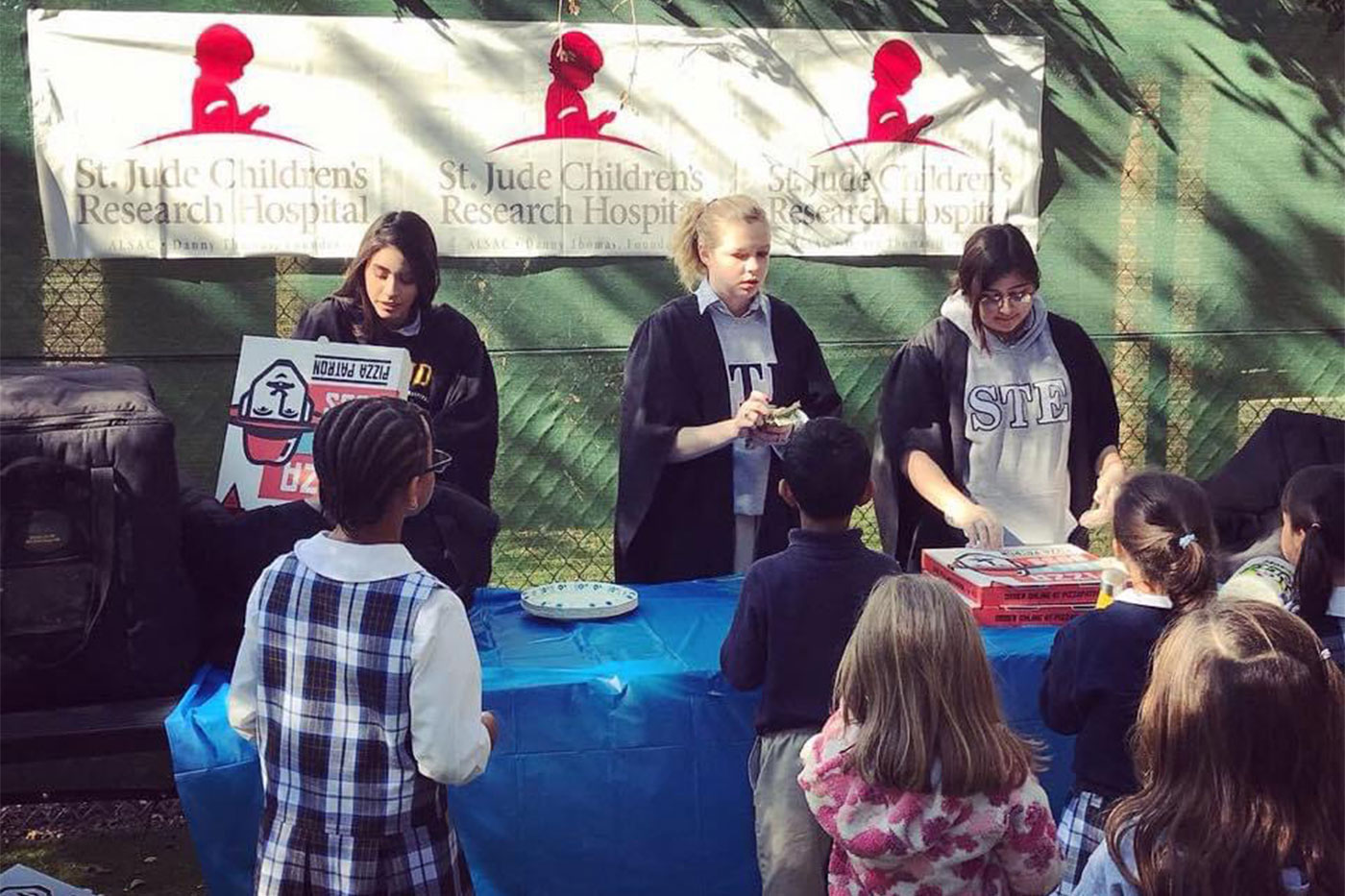
“I would sell pizza that was partly sponsored by a local pizza shop,” Sophia said. “All the money raised was donated to St. Jude because they were the ones who helped my family get in contact with the doctors who treated me during my whole journey of having leukemia. I was very fortunate to have both St. Jude and Texas Children’s helping me.”
Mary said it wasn’t easy at first when Sophia asked her and her husband to help start the foundation. Mary described Sophia as being “on the line between dead and alive,” so it was difficult for them as parents to acknowledge the possible outcome and be sure her name would be remembered and that her life wasn’t in vain.
“It was something to remind us forever who she was in life,” Mary said. “It was hard, but my husband and I started helping her. Even though she was so sick, she never was crying or showing us she was sad. She was a sparkling light – she wanted to help others, and she was not thinking about her life in that moment.”
After those successful pizza fundraisers, Sophia was recognized by St. Jude as its National Youth Leadership Ambassador, which reinforced her desire to reach more people with her foundation and her ultimate goal of helping others in adverse situations.
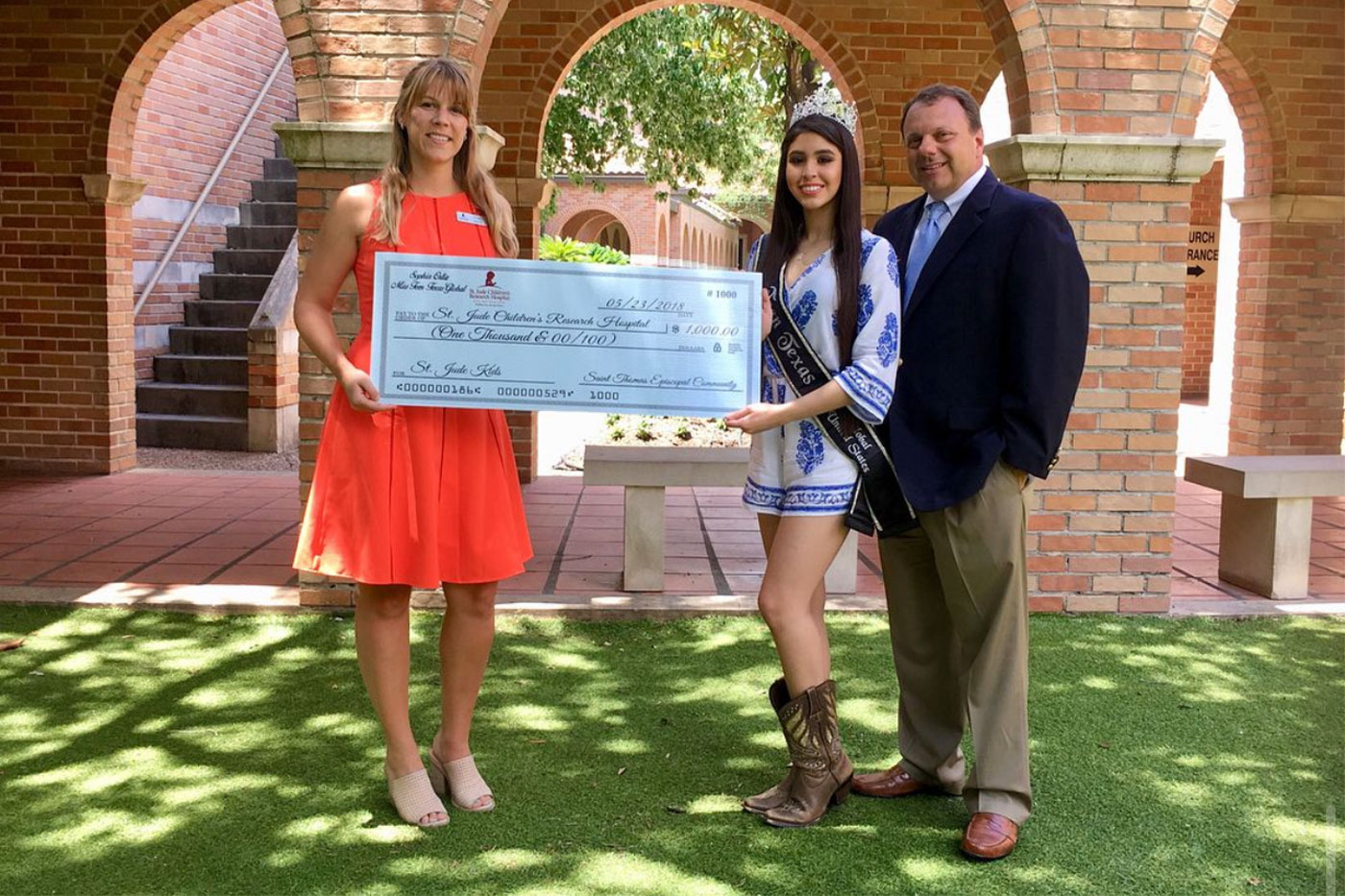
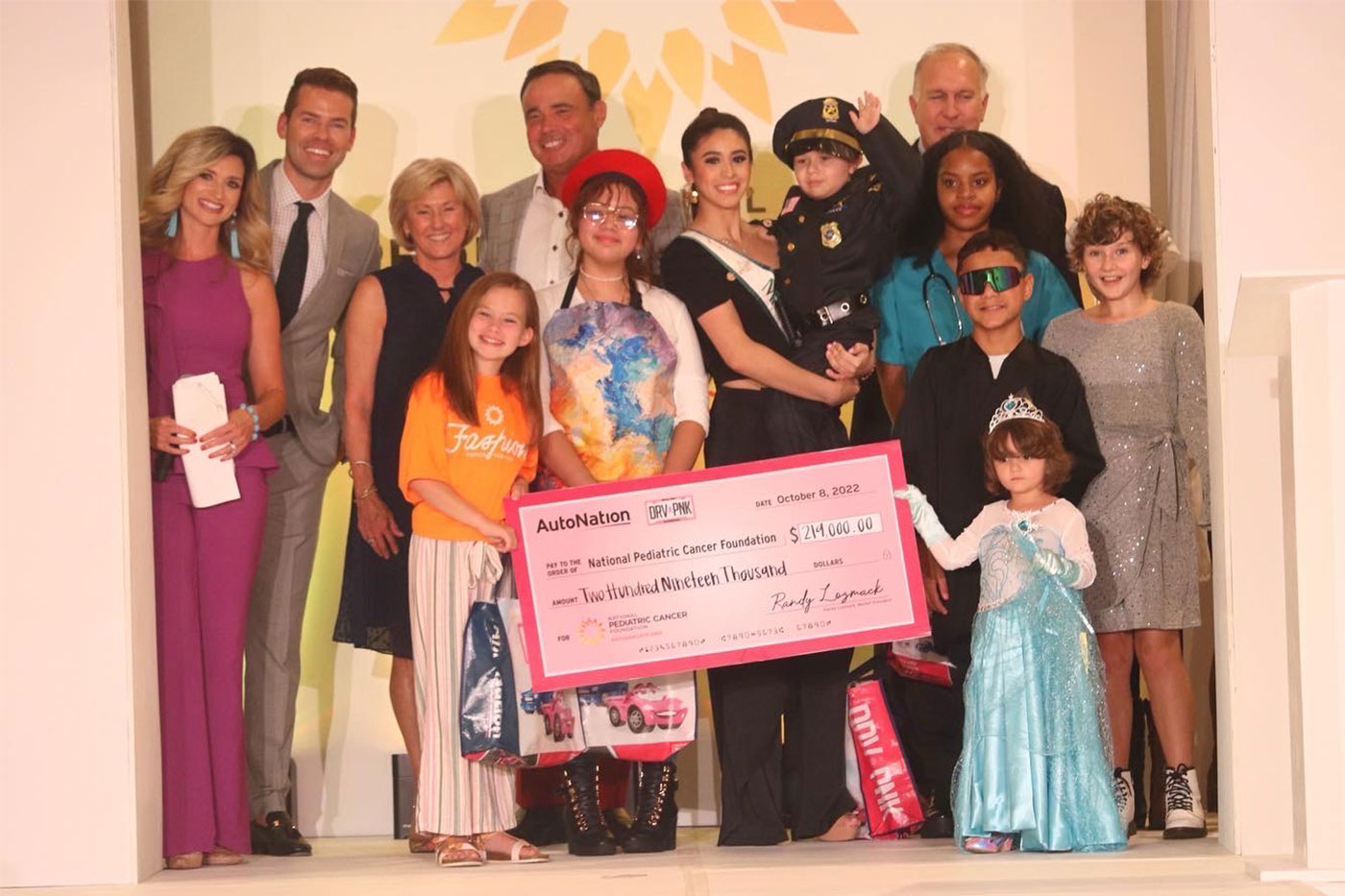
The Pageantry Platform
At 16, Sophia started participating in pageants as a distraction from leukemia and from not really knowing what was coming next or how long her future would be.
Her eyes sparkling, she talked about how she had always loved watching beauty pageants with her mom and grandma and how she thought it would be a fun experience to get to know other girls. It would also give her something to do apart from the constant doctors’ offices and hospital visits. Sophia recounted her surprise when she ended up winning the first pageant she entered – with no formal training – which fueled her journey in pageantry.
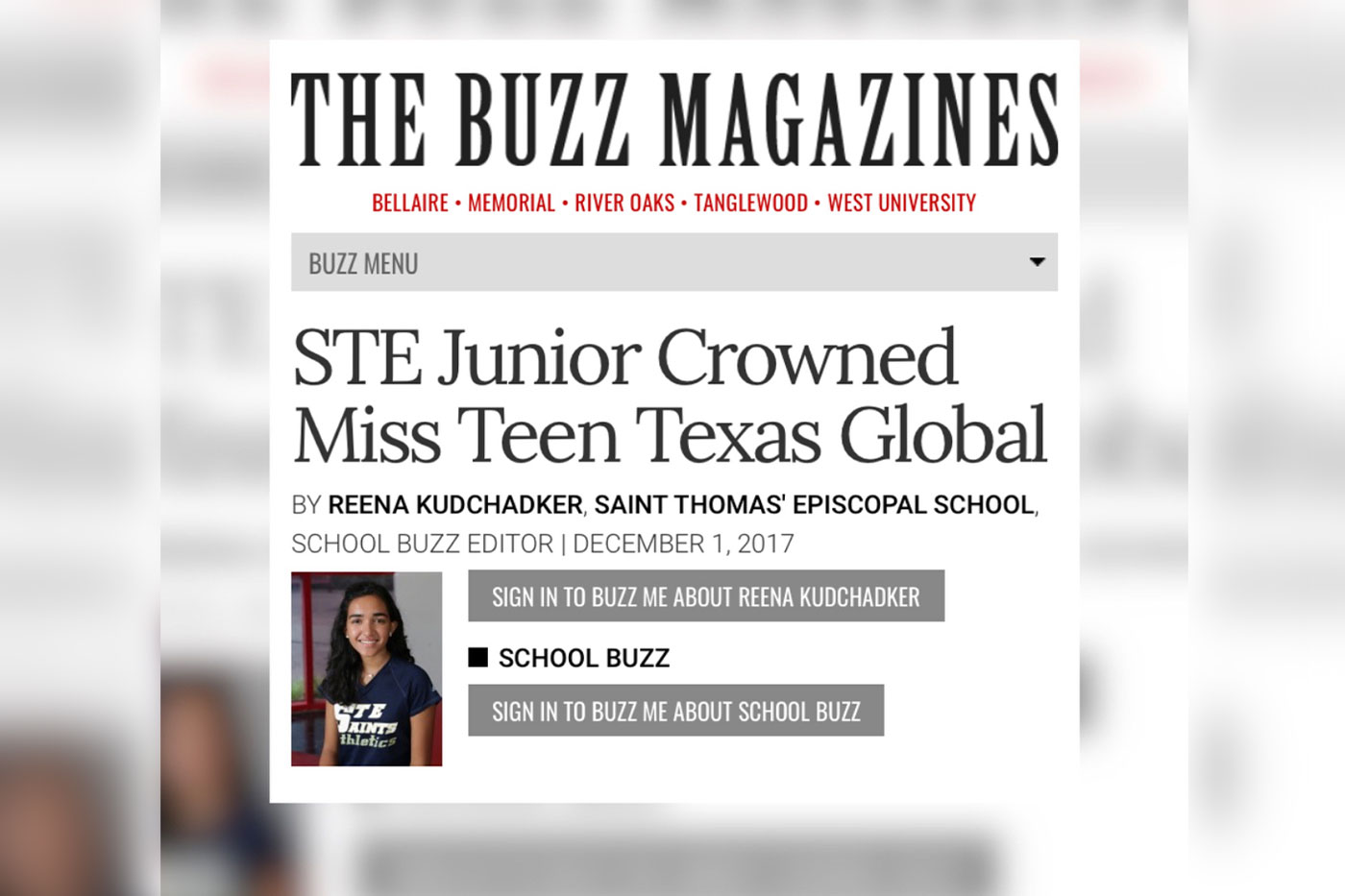
But the pageant circuit isn’t an easy path, even for the healthiest of young women.
Cancer treatment frequently leads to hair falling out – not the best look for a beauty queen. Aside from the physical battles associated with her illness, there were also mental and emotional challenges.
One thing she struggled with most was people telling her she needed to chop her hair off and get extensions, and she was already losing a lot of her hair in clumps.
To Sophia, having long hair is something very feminine, one of the defining aspects of womanhood. It was challenging to have to explain to each person who would tell her to simply chop her hair off, like it was no big deal, and to just put in extensions. It was much more complex than that in her situation. Everyone was much more understanding once she explained it to them, but it was definitely hard hearing all those comments.

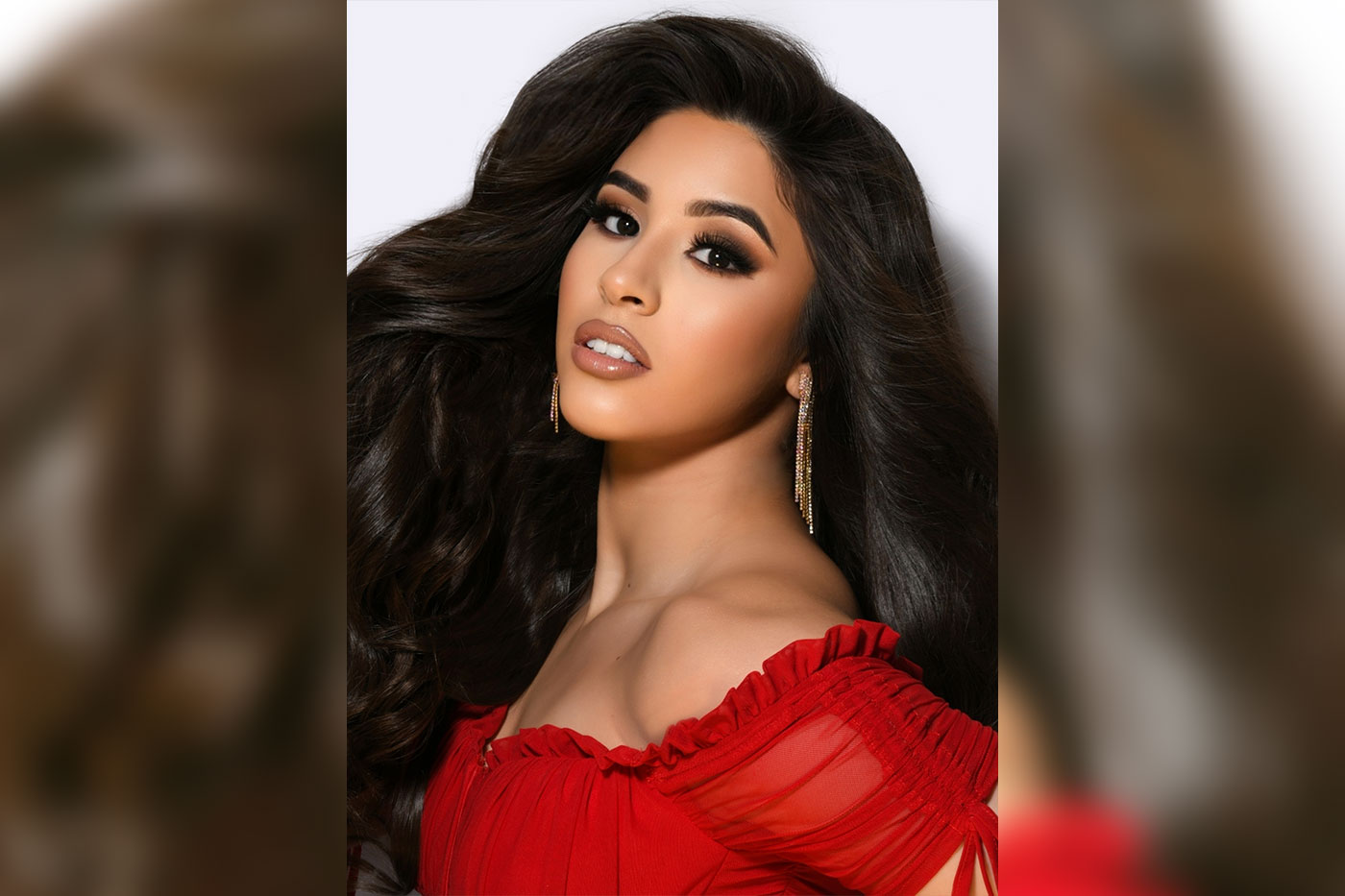
“The thing is, I knew myself, and I knew what I was going through, and I acknowledged the fact that a bystander wouldn’t be able to know that without being told,” Sophia said confidently. “Understanding the fact that not everyone knows what you’re going through is why you just have to be kind to everyone.”
Another challenge was criticism for never having her nails professionally done, either with acrylics or shellac polish. She was unable to do any of that due to the UV lamp radiation being harmful, and any type of nail varnish causing her a burning sensation.
“My nail beds were so weak. I also had other blood disorders that came along with having leukemia, and some I still have,” Sophia said resignedly. “I have to know how to take care of myself.”
Sophia’s positive attitude never surprised Cinnamon Phillips, a family friend – well, more like family – who has known Sophia since she was 5. Cinnamon describes Sophia as always being a positive person, a beautiful soul even as a little girl.
“I feel like being an educator for the past 24 years, I can pick up on those children that just have something that sets them apart from the rest, that extra something that lets you know that whatever they do in life they are going to go far. I saw that in her at 5 years old. Sophia has grown to be like a little sister who I love and adore; she is family.
Having competed in pageants for 15 years in her home state of Missouri, as well as being a former NFL cheerleader for the Kansas City Chiefs, Cinnamon always thought Sophia would be great in pageants.
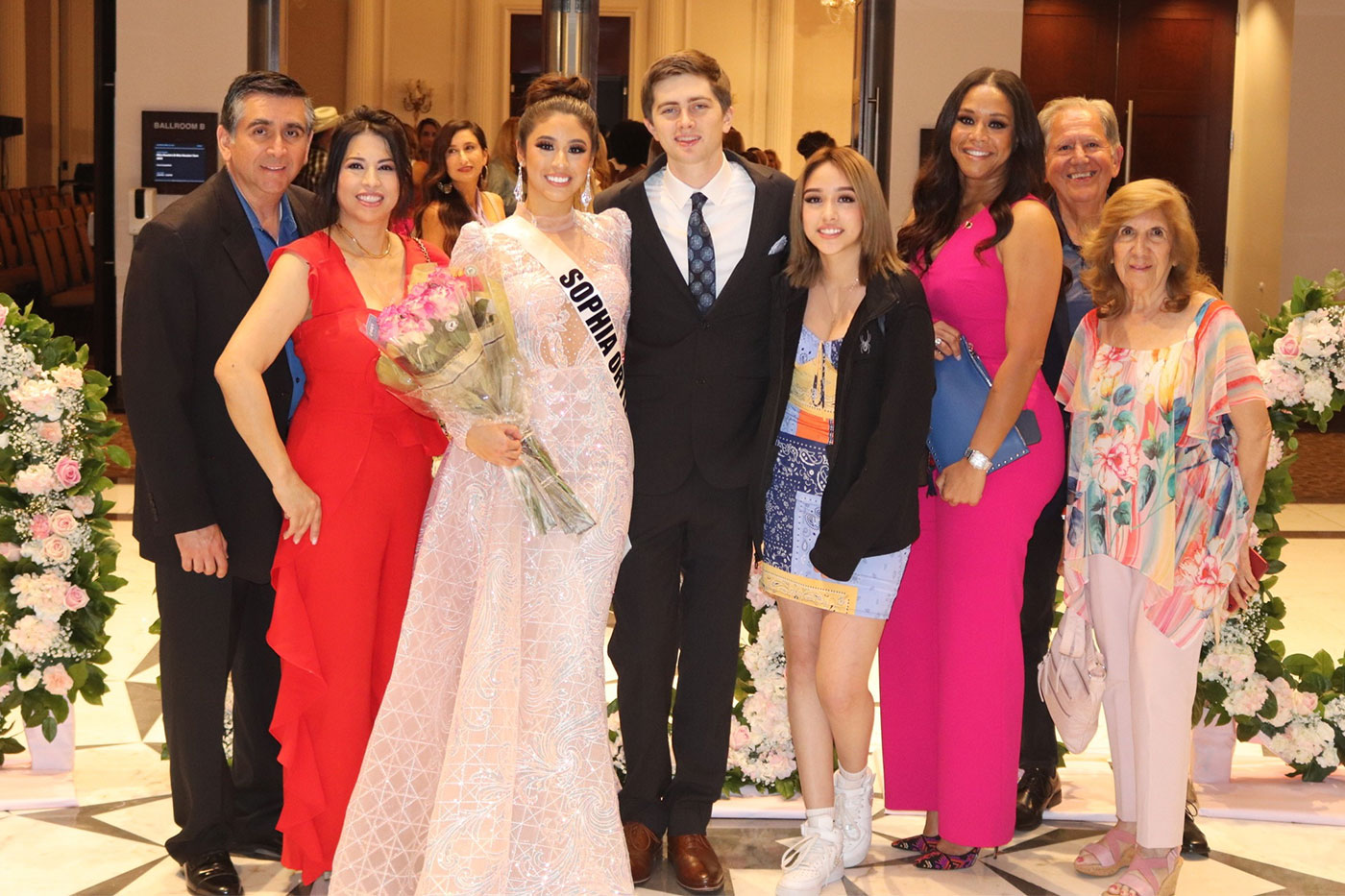
“Sophia possesses that can-do and will-do attitude about everything and every goal she sets to accomplish,” Cinnamon added. “To watch Sophia compete in her pageants and walk the runways at fashion shows at times leaves me speechless and at other times has me in tears and on the edge of my seat. When she walks on stage, her class, elegance, her overall presence, Sophia owns whatever stage she is on.”
The College Quandary
Sophia rang the bell for being cancer-free in 2019, also the year she started her first semester of college at Baylor University.
Sophia also had personal life goals, which were to be able to represent the U.S. at an international pageant level and disseminate information about her foundation.
“I found that pageantry was the best way to spread the word because when you walk into a room wearing a crown and a sash, it’s like placing a microphone right in front of you, and everyone wants to hear what you have to say.”
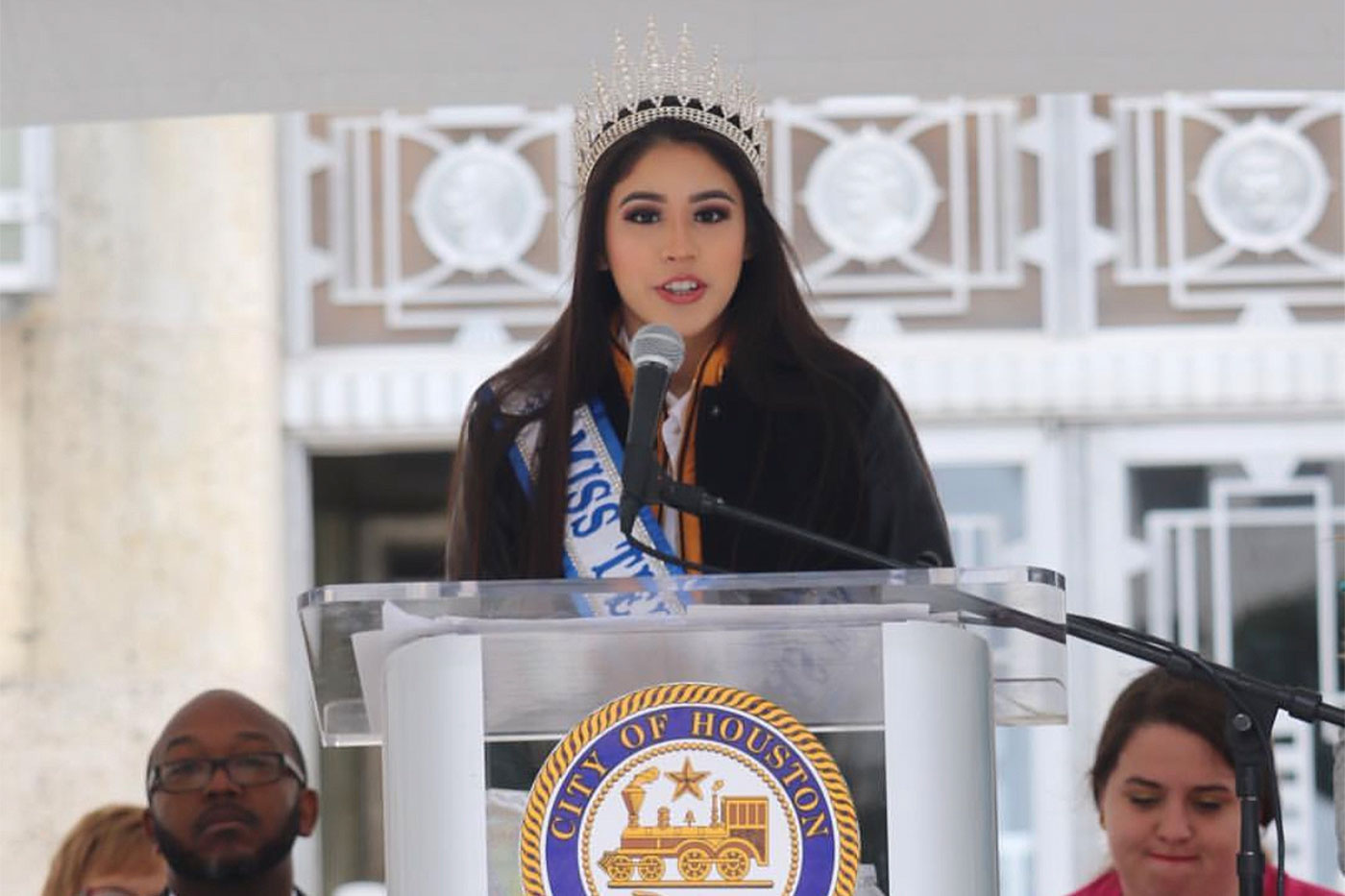
During her time at Baylor, Sophia was also about to compete internationally because she held the title of Miss Teen Americas USA. If she were to win the international title, she would not have been able to continue school that year because she would have had to be traveling back and forth, working on her pageant platform of her foundation philanthropy.
When she requested flexibility for her coursework due to health and travel, she realized the university was not going to be a good fit for her because it declined to make necessary accommodations.
“I knew this was just not going to work out,” Sophia said. “I needed someone who was going to accommodate my personal goals and my academic goals.”
However, having taken a hybrid program at Baylor, a mix of in-person and online courses – and then strictly online during the pandemic – she was able to recognize that school online was what worked best for her. She also knew she needed to chase her dream – internationally, nationally or even just in Texas – to represent America because of the reach it would give her to connect with people.
About this time, her sister Valerie was deciding she would go to college at Texas Tech. Sophia had never given any thought to the university “way out in Lubbock.”
“At that time, I was just taking some classes online to apply to dental school, my plan at the time – that’s what I did for about a semester,” Sophia said. “At that point my sister had gone off to Texas Tech, and I had heard a lot of positive feedback from her experience there. I was like, ‘Huh! Maybe that’s something to look into.’”
When Valerie came to Texas Tech in 2022, Sophia accompanied her. They explored the campus together, Sophia noting, “It was a lot bigger than Baylor.”
Having dyslexia and ADHD, Valerie got help from Texas Tech’s Student Disability Services.
“Sophia thought that was pretty cool; she’s not dyslexic or needed accommodations. But she liked that they did that for me because her friend at Baylor had the same issues, and they didn’t really give her all the accommodations,” Valerie said. “I got sick a lot my first year. Sophia saw how helpful my teachers were when I was sick; I could reschedule tests, find a day I was feeling better, like that.”
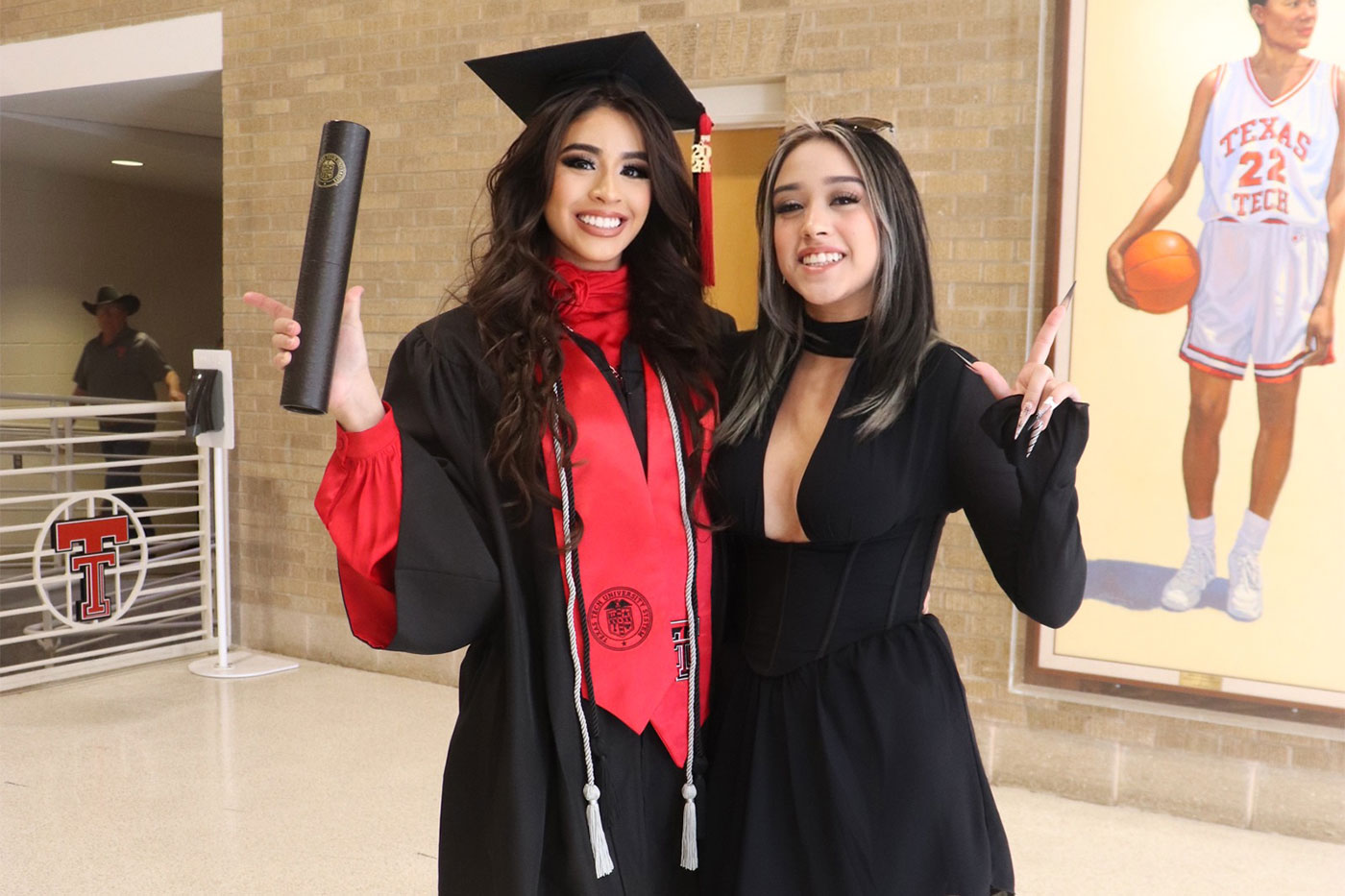
Sophia began mentioning to Valerie she was liking what she heard about Texas Tech. But she really liked being close to her parents, and she wasn’t sure how she’d get along on such a large campus.
Sophia started reading up on Texas Tech and found out that there was a Texas Tech site in Waco.
She felt like she was being led to find out what Texas Tech is about; she saw all the online programs they have - and at a location that worked for her. It wasn’t too far away from home and was also convenient to her because she happened to be in Waco already.
Sophia applied to Texas Tech and enrolled as quickly as possible. She could tell immediately when she started going through the advisement process that everything was different, and in a good way.
“Sometimes you find your place, and other times you realize what you thought was your place, is not,” Sophia said with quiet conviction.
Reflecting on her sister’s experience, Valerie grins and says Sophia really loved it a lot.
“She tells me all the time, ‘I’m so glad you went to Texas Tech because if you hadn’t come to Tech, I wouldn’t have known about it,’” Valerie said. “I knew I wanted to come to Texas Tech since about my junior year in high school. When she finally transferred here, I hooked her up with all the gear. We’re always looking at the Texas Tech merchandise online, finding matching shirts and stuff.”
Sophia knew deep down, transferring to Texas Tech would give her the flexibility to make her mark on the world.
Life is Precious
Amid changing schools and competing in pageants, Sophia continued to build her foundation. She didn’t want her legacy to just be “the girl who passed away with leukemia.” She wanted it to be much more than that, a story of resilience, of inspiration and hope to people who were in a situation like hers or just going through any hardship in their life.
“I realized that pain isn’t something that just comes in the form of a major illness, but it can be feeling stuck in your life,” Sophia explained. “It can be feeling like you’re not following your life’s true goal. So, I really just tried to speak to others and serve as a voice of hope and inspiration, to persevere through whatever challenge is going on in your life because life only comes once, and it really is precious.”
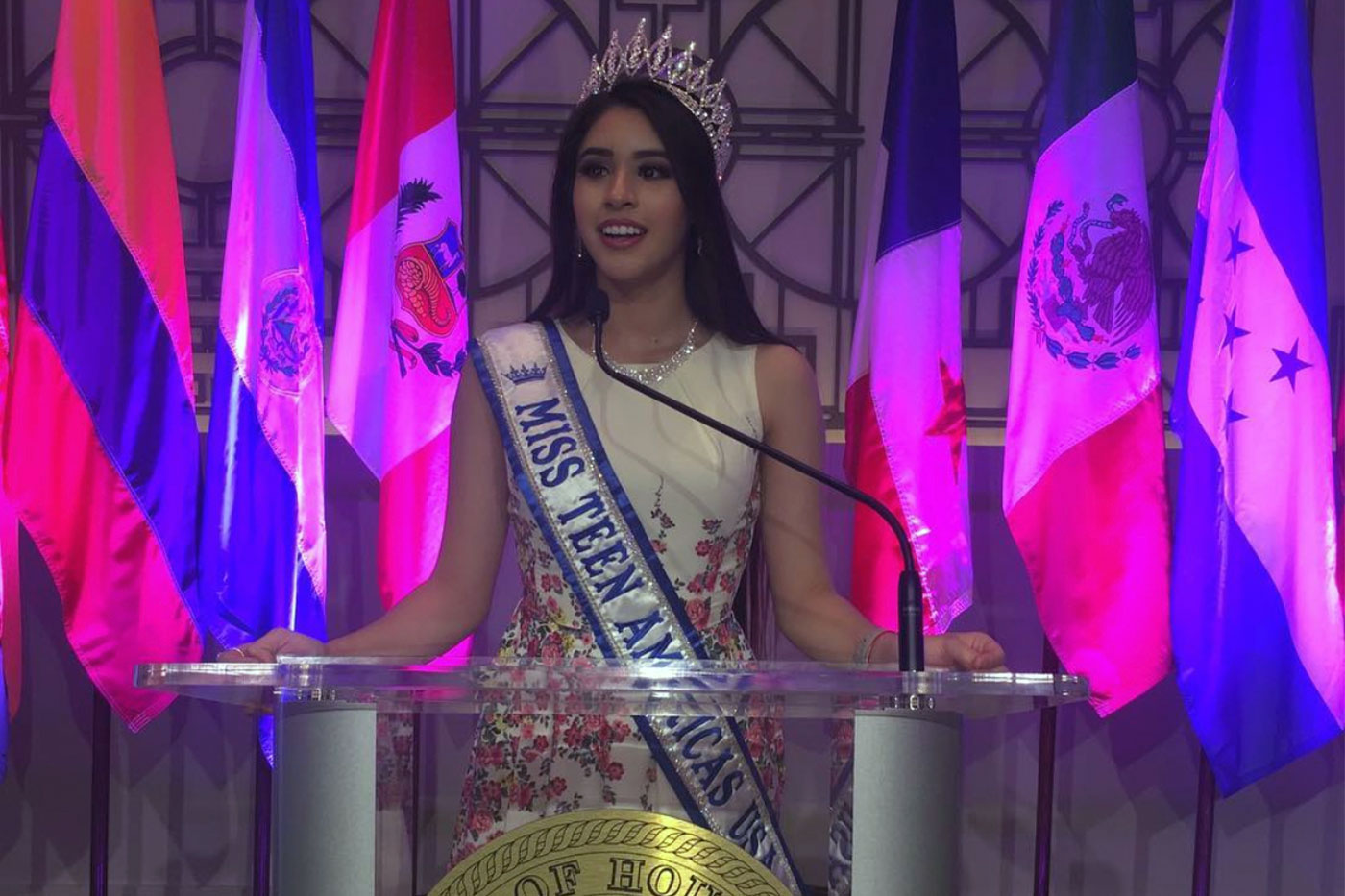
Sophia most recently held the title Miss World America Texas. She competed in the system’s national pageant, Miss World America, in October 2023. Sophia was attracted to the Miss World system because the organizers pride themselves on their mantra, “Beauty with a purpose,” meaning they don’t want just another pretty face who doesn’t do anything for others. They want a leader who takes action within the community, makes a change in other people’s lives and makes a positive impact. That is exactly why Sophia got into pageantry; she still feels it’s truly the best way to do so.
Soon enough, she realized she wanted to grow Life is Precious to be able to help more than just childhood cancer patients. She set her sights on larger human rights issues because those cover anything from health adversity to economic disparity to access to education. In 2023 she started to expand her foundation’s reach from a national to an international level.
Benefiting Barranquilla
Sophia comes from Mexican and Colombian heritage, with her mother’s roots in Barranquilla, Colombia. Sophia traveled there in April 2023 to work alongside the government in its “I Am Bilingual” program.
She had organized a book drive for students learning English as a second language who hope to make it their primary language because of how many opportunities that gives them. Being fluent in English gives them an opportunity to work at call centers and earn money in U.S. dollars instead of pesos.
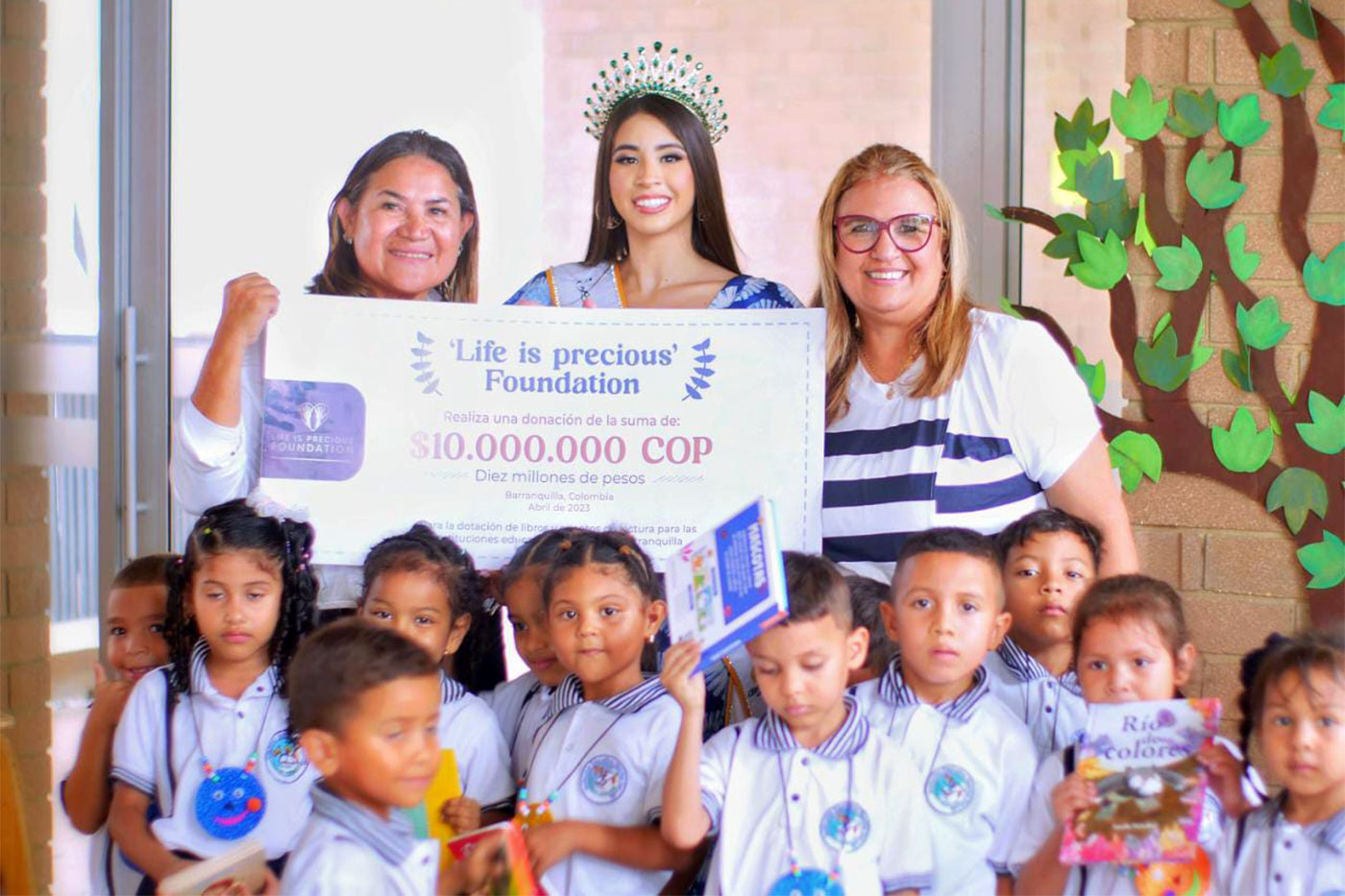
Determined to assist the people of that city, Sophia reached out to the mayor of Barranquilla, Jaime Pumarejo. It was hard to contact him at first, but she was driven to be able to help the community where her roots lie. Sophia messaged him “day and night,” and it was her persistence and passion that led to finally securing a meeting with him. Eagerly sharing her ideas with him, she wanted to know not only if she could do the book drive, but how soon. The mayor thought it was a great idea that she wanted to bring learning materials to the kids there, especially with the bilingual program they were launching.
Off to Barranquilla she went. She visited several different schools and, in tandem with city and government leaders, gave speeches to girls about why it’s important to continue their interest in science, technology, engineering and math (STEM). Women in the country are being encouraged to explore STEM, as jobs in those fields are the highest-earning positions they can go into.
Working with the secretary of education of Barranquilla, Bibiana Rinćon Luque, she was connected to a school in Las Gardenias, founded a complete library for them and also funded textbooks for their younger kids at the elementary level and later for the middle school level. Because of Life is Precious, those children can access and immerse themselves in a whole different world of literacy. Sophia is proud her foundation was able to give that meaningful opportunity to them just by donating something as simple as books. The experience left a lasting impression on her.
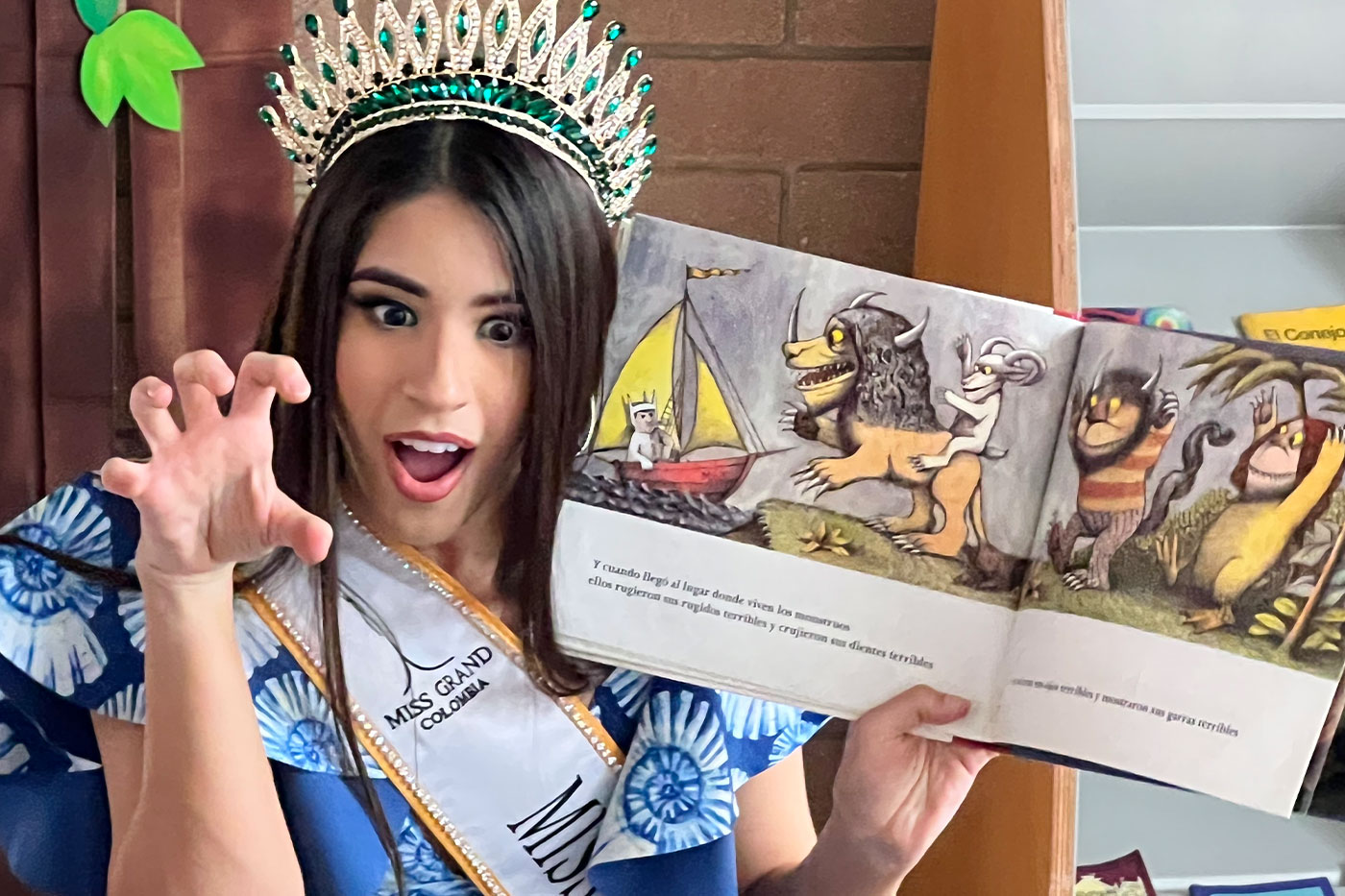
She was giving speeches in schools where they didn’t have air conditioning, and they were expected to learn there. Sophia was in schools that barely had infrastructure.
“I sometimes found it hard to be attentive in class, and I had all the luxuries: having A/C, being able to take notes on one of the newest iPads, a bottle of water with me all the time,” she acknowledged. “You don’t even realize they are luxuries until you go somewhere where they don’t have these things.”
But aside from so much need in the schools, Sophia saw another side of her ancestral town. There were no paved streets – they were dirt and rocks and sticks thrown together. It’s an area people say not to enter unless you have to because of how dangerous it is. She described gang violence and crime – people coming out and fighting each other with knives and guns.
“Some of the houses were riddled with bullets; there were shells on the floor, and it was just really terrible to see,” Sophia said, her voice wavering. “And I knew I needed to do something to give back.”
The ‘Quince’ Contribution
When Sophia returned to Texas, she was talking with one of her sponsors who helps her find dresses for pageants. Karim Viranski, owner of Valencia Couture, has become a close friend. Upon explaining to him everything she saw in Colombia, Viranski asked if these girls have quinceañeras. In Hispanic culture a quinceañera is that moment at age 15, which signifies the transition from girlhood into womanhood. Quinces are still very prominent in Colombia, and it’s an important event for young girls there. She recalled the conversation going something like this.
“But I’m afraid these girls are not even thinking about that,” she told Karim. “They’re thinking about, ‘What am I going to eat tomorrow.’ Those are the kinds of things on their minds, but I’m sure it’s something in their hopes and dreams. Everybody dreams of having that princess moment.”
“What if I donate quince gowns to your foundation, and you take them and do something for these girls?” Karim asked sincerely.
“Karim, are you serious? That’s a really big deal! These are gowns that cost thousands of dollars! Are you sure? Are you sure?” Sophia queried, wanting to be absolutely positive of what he was saying.
“Sophia, for you and your foundation and the impact you’re going to make, anything!”
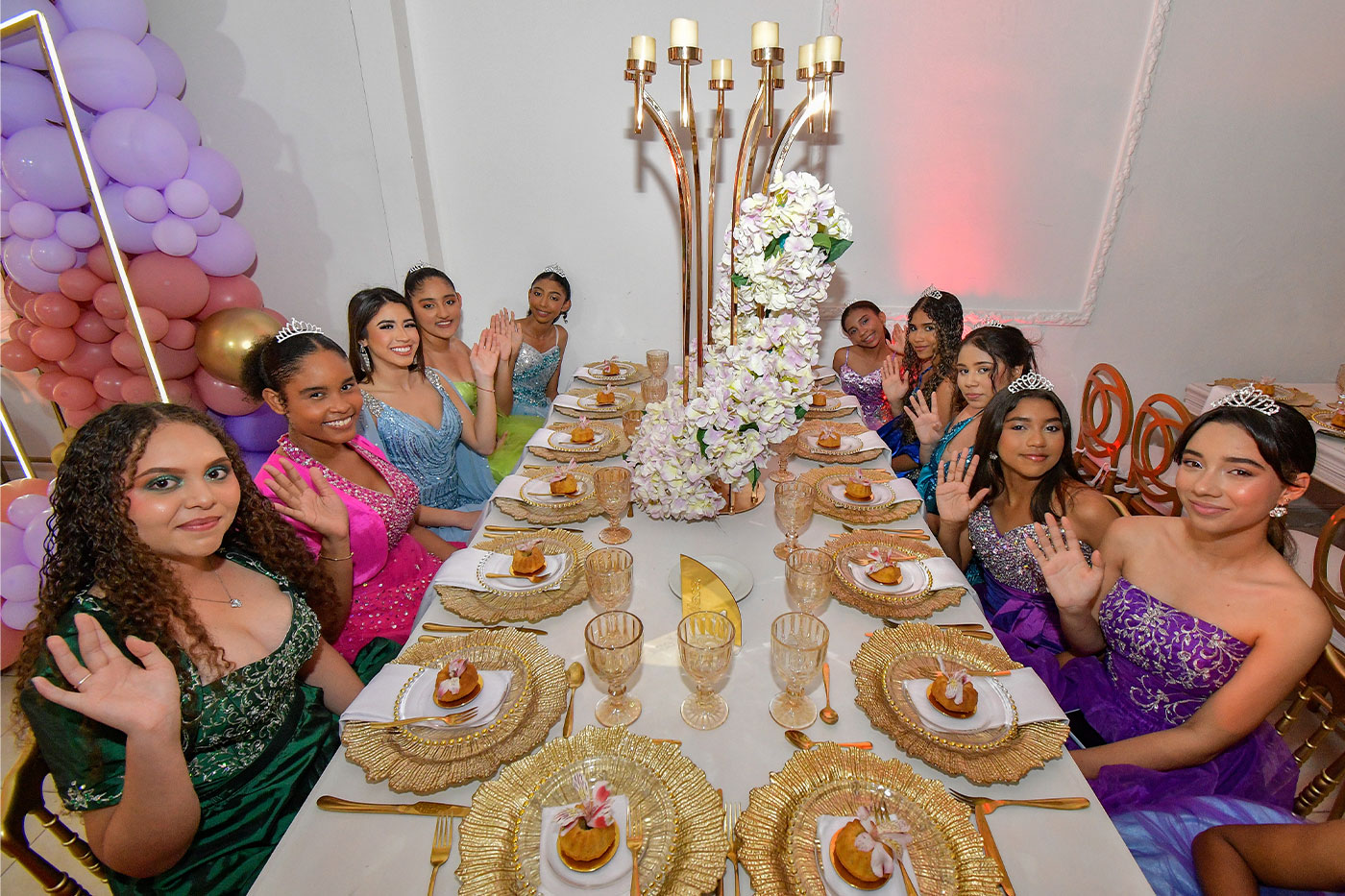
The project started on a small scale because she hadn’t thought about how much she could do. The criteria were based not only on financial need but also on academic excellence. Originally, she thought she was just going to find a handful of girls who met the requirements, give them their dress, help do a little makeup, take some pictures and have their moms come along.
Sophia explained that having academic merit as a consideration would inspire the young women educationally, helping to foster an encouraging spirit for girls in the grades below to do well in school, to be able to look forward to future events like this.

But when she got to Colombia, she spent more than a month there. With assistance from her media manager, she did several TV and radio interviews to spread her message and the work she wanted to do in the country. After the media appearances, Sophia quickly obtained enough support to put on a quinceañera much bigger than she ever envisioned. With the help of the secretary of education, they selected 30 girls.
Her family friend and mentor, Cinnamon, has been able to watch from a front-row seat.
“What she does for her foundation, the extent she goes to helping others is how she is in everyday life,” Cinnamon said. “She’s just genuine. It’s simply Sophia. It’s who she is. If you ever have ever been fortunate enough to meet her, you would know just how blessed you are to cross paths with her.”
Future Focus
Sophia says her top two priorities are helping people with health adversities and continuing to promote the importance of education. But a more current focus encompasses human rights, in terms of basic access to life’s necessities. For instance, one of her current projects is to take clean water reserves to an indigenous community in Colombia, in an area known as La Guajira. It’s a piece of land filled with about 500 indigenous communities. They lack access to basic plumbing, infrastructure, clean drinking water and electricity.
Sophia was able to visit the area again in the summer months. She saw what life was really like there.
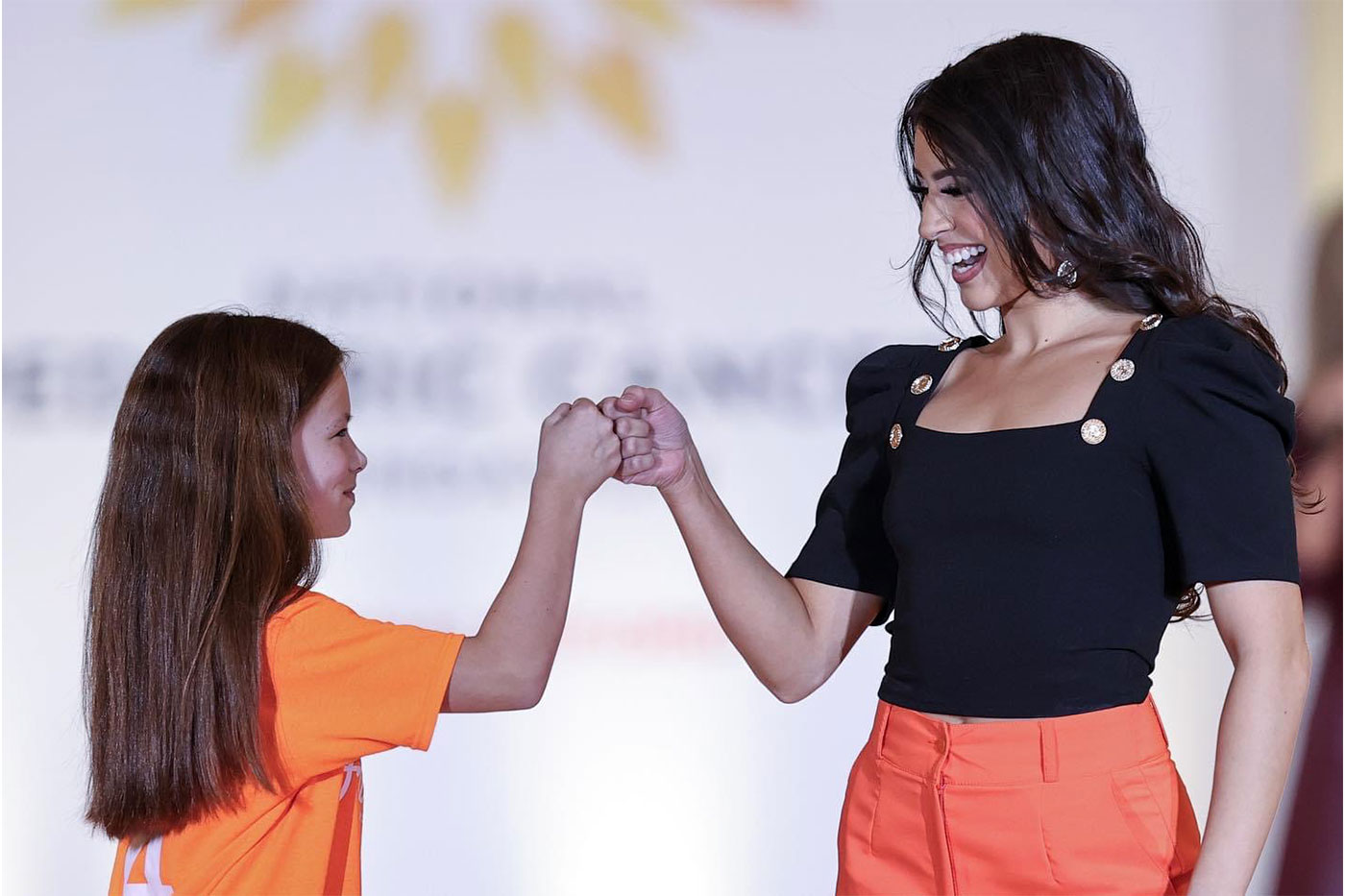
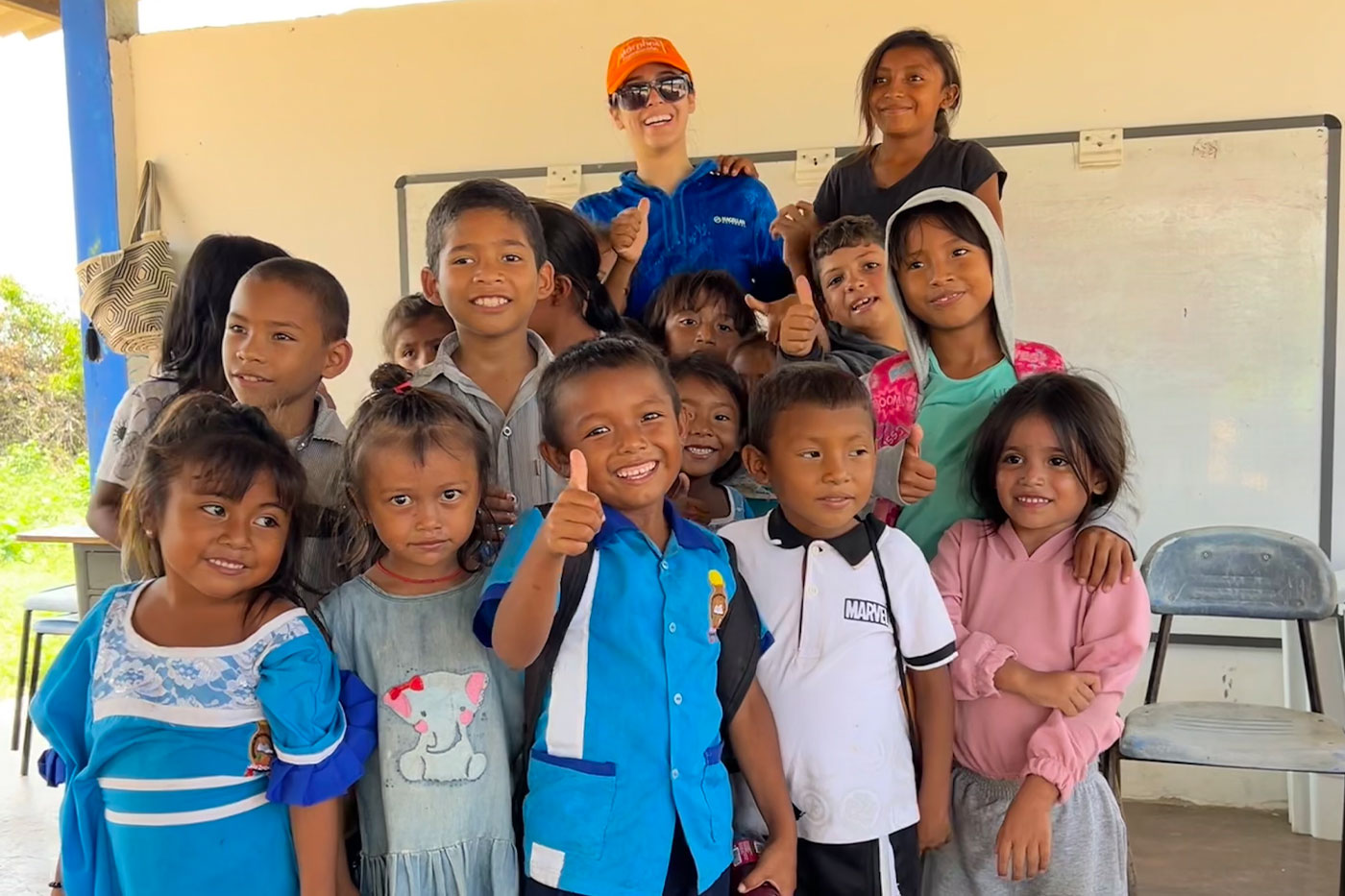
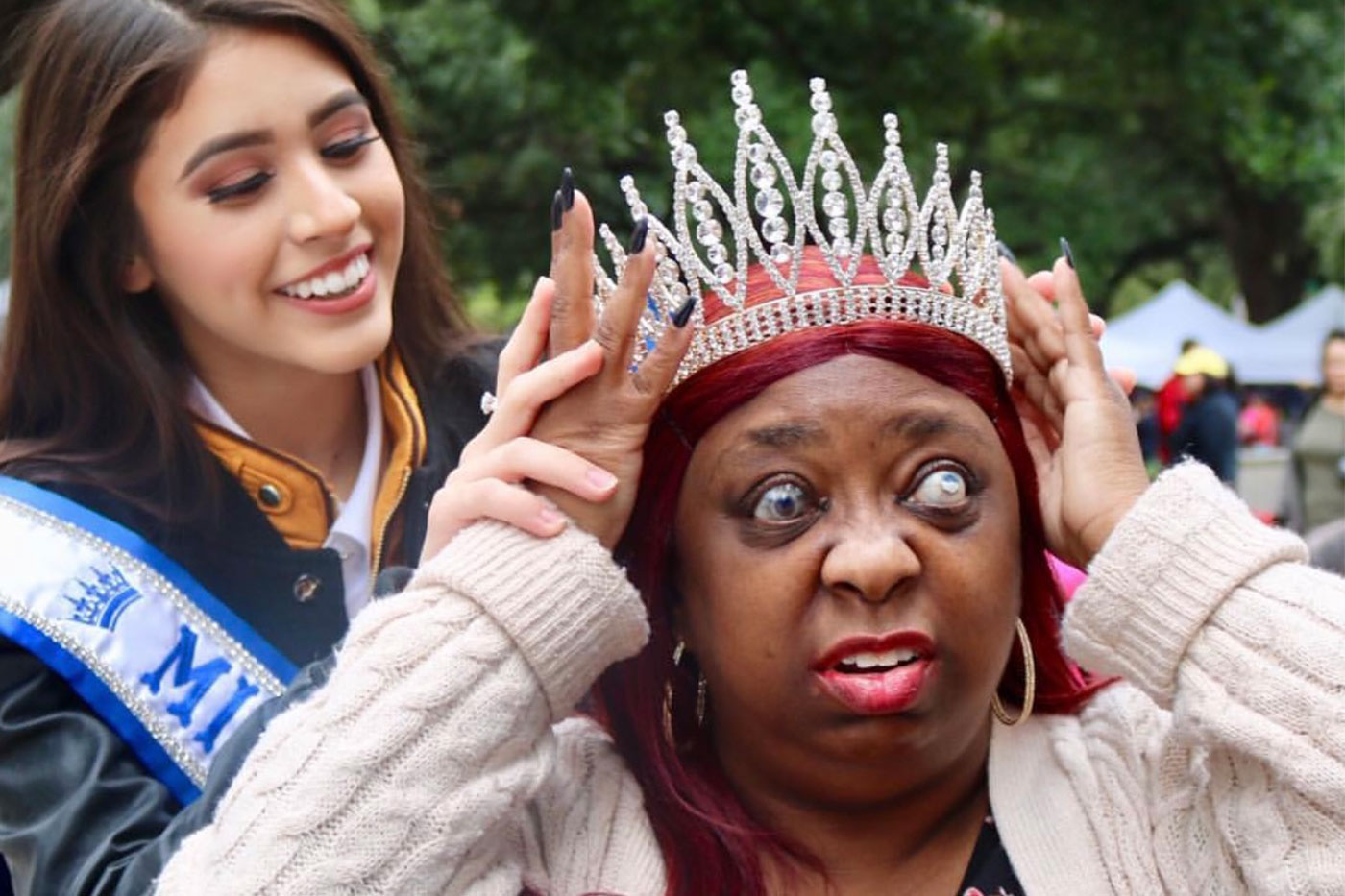
“When I tell you that some of the things were just truly terrible, I mean children and adults going to the restroom in ditches they’d just dug up into the sand and dirt – and when they finished, they’d just cover it up with dirt and sand so it wouldn’t smell too terrible,” Sophia said with a grimace. “Another thing was the animal life there. I mean, if the people don’t know what they’re going to eat, you can just imagine what some of the dogs looked like, literally flesh and bone. And if the humans don’t have water, the animals certainly don’t.”
Sophia described their “school” beneath trees, where students sit on the ground or on ledges of dirt they’ve piled up – and in the middle of the desert heat.
“It’s miserable – it’s just cacti, dirt, sand,” Sophia said. “We also want to give them the means to sustain themselves, so we eventually want to give them the agricultural means to produce their own goods.”
To that end, Life is Precious has partnered with two other foundations in Colombia, Guajira Verde and Morphos Foundation. The all-around goal is to give the indigenous people access to education, clean water and agricultural sustainability.
Reaching Her Own Goals
Sophia knows she wouldn’t have accomplished so much and achieved her college graduation without Texas Tech Online. Finding the flexible program allowed her to be able to continue to chase her personal dreams while also allowing her to pursue her academic goals of striving for her degree.\Online and hybrid courses made it easier for professors to work with her schedule, something she found to be useful, especially around the time she was planning pageant competition and during philanthropic travel. Her professors were accommodating with her schedule as long as she communicated with them.
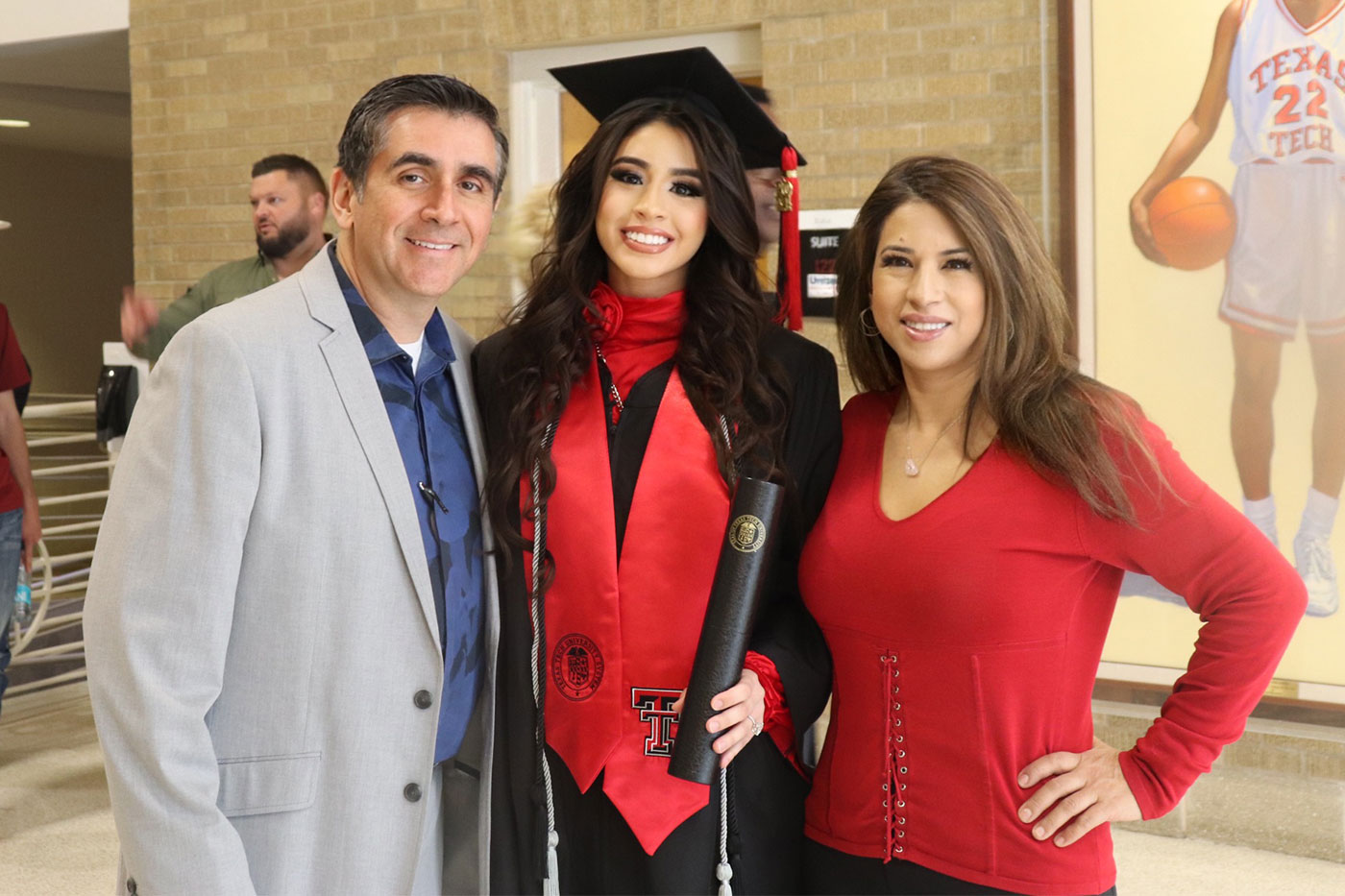
Sophia says her total experience was stellar, describing the application process as relaxed, warm and welcoming – even refreshing. She didn’t feel like she was being judged solely on academics, but that she was evaluated holistically. Sophia felt her advisor was someone she could trust to guide her with her courses.
“I think I’m the perfect example of someone who didn’t know about Texas Tech and hadn’t considered it. I didn’t think I was going to become a Red Raider, but here I am today,” she said. “And all it took – aside from the nudging from my sister – was one simple search to figure out they had something that would interest me. And lo and behold, they did.”
Through the cancer journey, pageantry, philanthropy, education, world travel and more, Sophia still made time for love. Less than a week after her graduation from Texas Tech, she married her high school sweetheart, Bobby Gray, a Red Raider majoring in finance in the Jerry S. Rawls College of Business. He is set to graduate this summer.
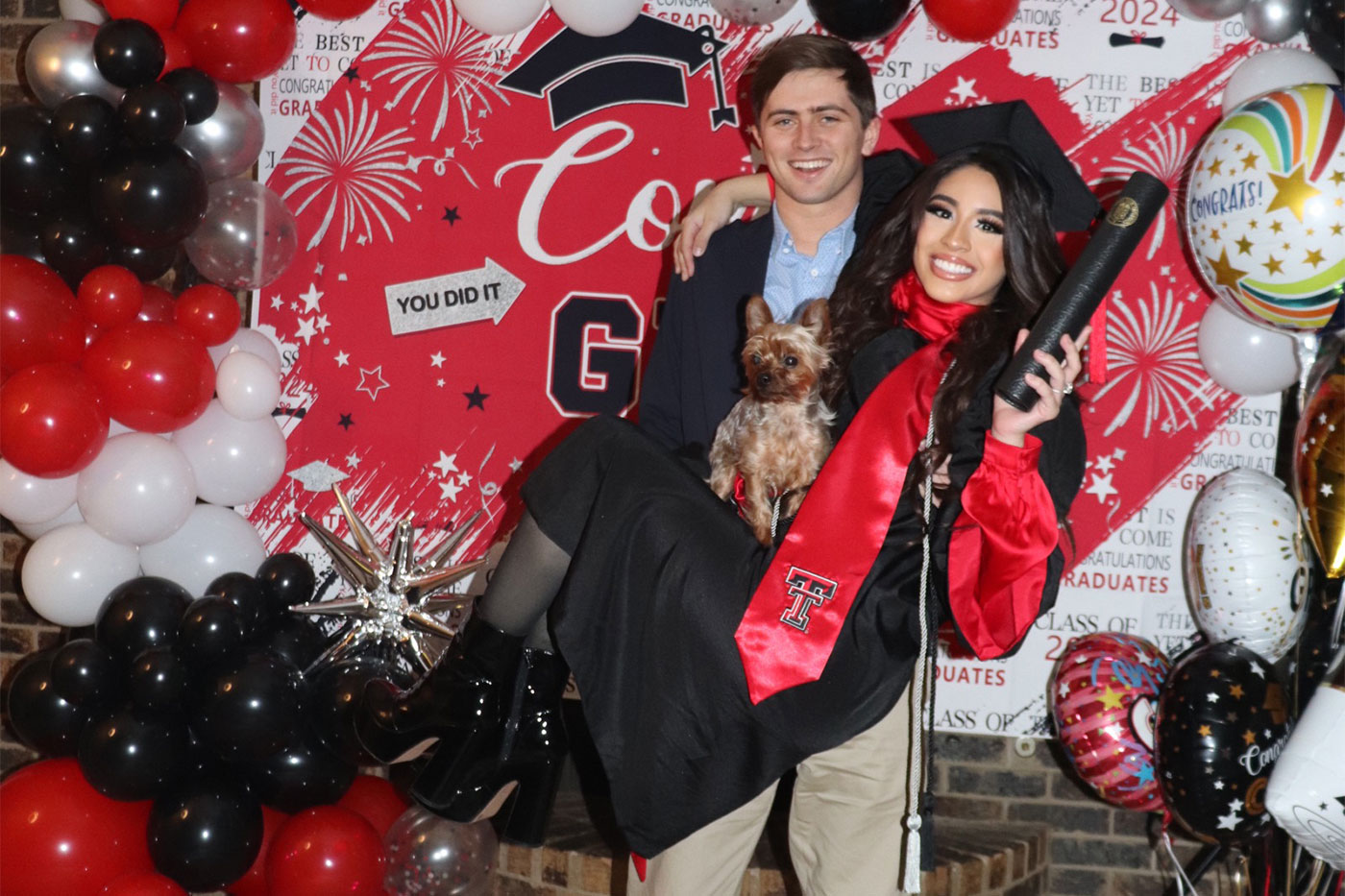
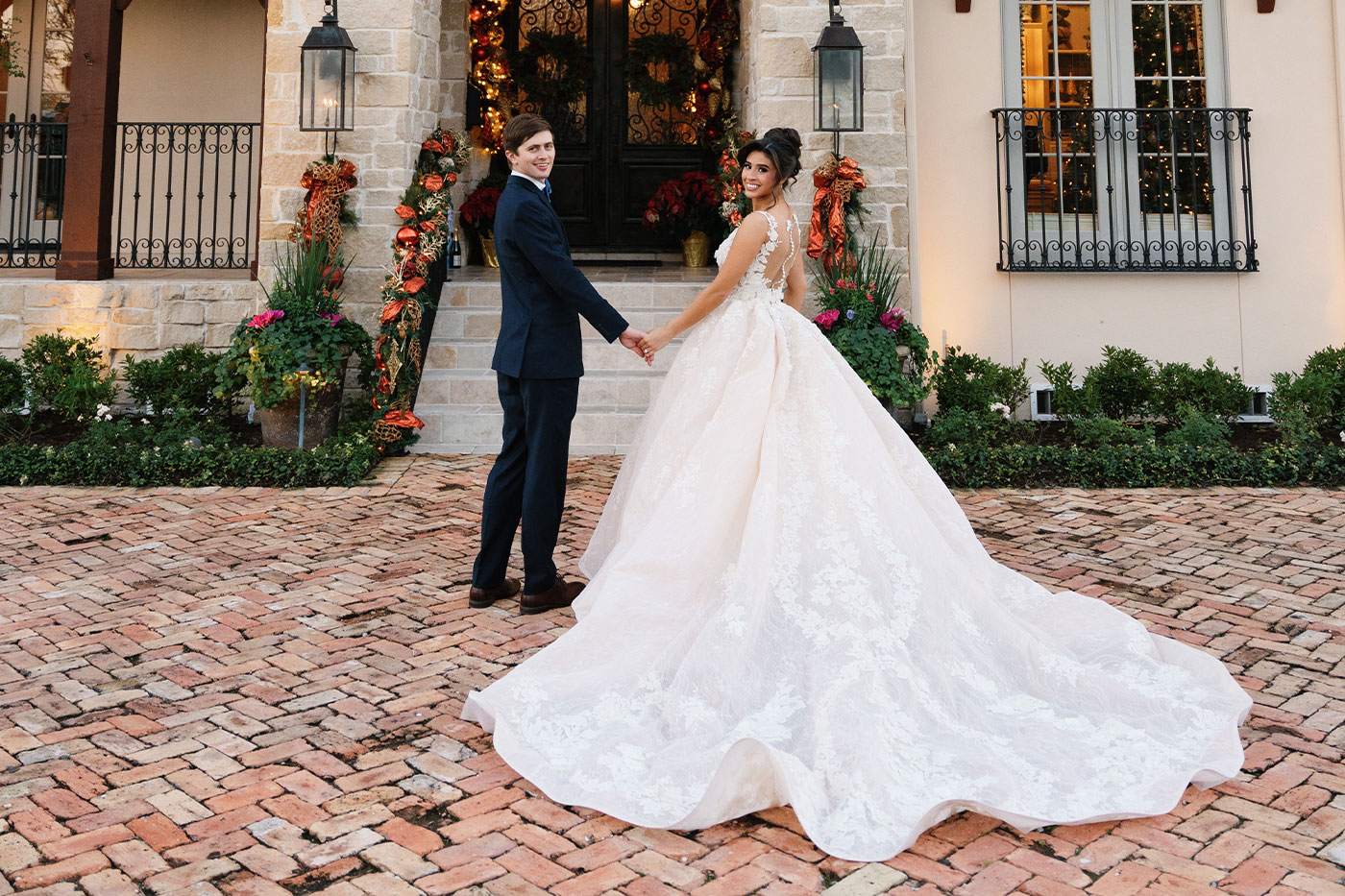
And although Sophia’s most recent pageant title ended last year, she says she most definitely will continue working on her foundation “from now until the day I die.” She hopes her kids will uphold that legacy as time goes on. She intends to continue competing in pageants, knowing they’re a great platform to help initiate change and provide her with networking opportunities and lifelong friendships.
Reflecting on teenage cancer patient Sophia making a decision to make a difference, and older cancer survivor Sophia finding a way to do so, she believes the entire purpose of her second chance at life is to help as many as she can.
“That’s truly my goal,” she said. “Once you are declared ‘cancer free,’ it’s not really cancer free; you never know what might happen. I’m just very grateful to have this current second chance at life from God, and I feel that I was given this opportunity for something bigger in my life.”

